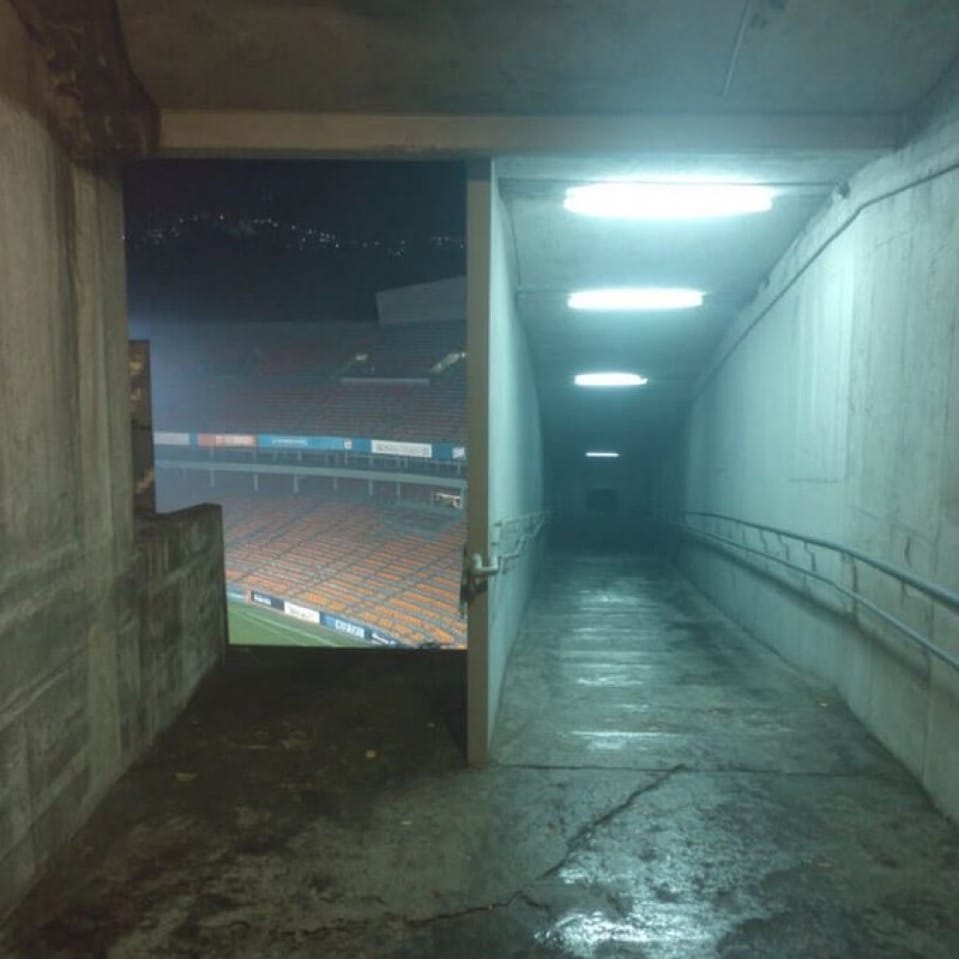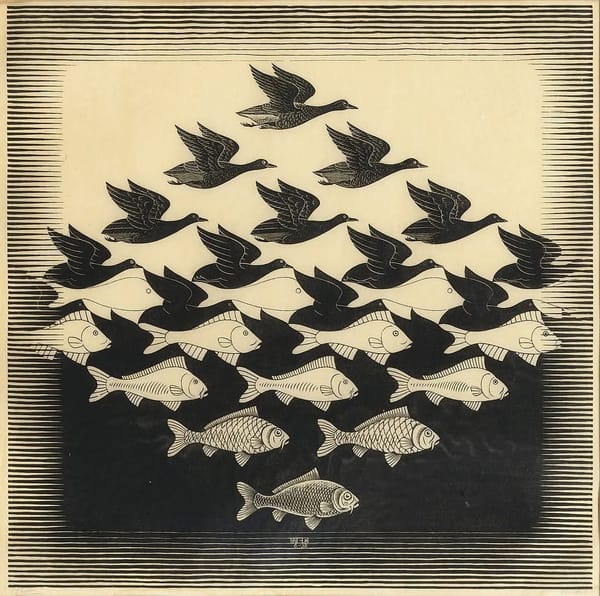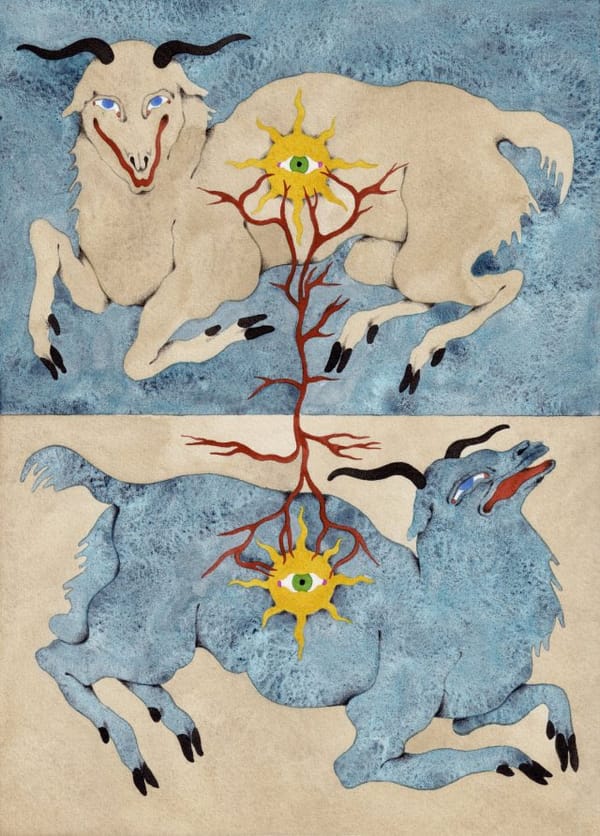Chat, is this real?
The fall of the fifth wall and the stubbornness of truth

I
You're out here on the Internet. Maybe you're scrolling, maybe not. You come across something. This, let's say. Some part of your brain goes: Let's move on. Where, exactly, does that come from? Have you ever thought about it? How much comes from the thing in front of you truly boring or offending you and how much comes from your knowledge of what else may be out there, the limited time you have? Is it that the algorithm served you something bad or that you know it has more to show you? It came to you for a reason; you have the time for it; these are facts.
II
The vote of the audience has been a staple of Love Island since it first aired ten years ago, but in recent seasons, the questions being voted on have multiplied. They've moved beyond “who should go home?” and into specifics: “who's the fakest?” Contestants discuss the public as if it’s a character – what did the public see that I missed – and their reactions, in turn, affect how the public watches and votes. A feedback loop. The line between not just the show and the audience (the fourth wall) but between “the show called Love Island” and “the wider world around the show called Love Island” blurs. A fifth wall develops cracks.
III
“It’s not that we got all political,” the creators of South Park said in a recent interview. “It’s that politics became pop culture.”
IV
When one or five or ten cameras record a situation, the truth is clear. Just look at the footage. When ten thousand cameras record it, new issues crop up. Storing and sorting the footage, for one. And check out this angle – play that back again, that's crazy. Okay, back to investigating the truth. A nerd in the corner, managing the footage, stops polishing his katana and chimes in: The truth...that's just the angle with the most eyes on it. Whoa, that's super deep, thanks bro. Finally a few investigators say: we'll just average every angle. This, of course, results in the least true angle of all.
V
A manager advises a team to think about the retrospective they’ll do in 8 weeks, where they'll ask "what went wrong," and in the present, simply avoid doing that stuff wrong. A headline says something like "You Won't Believe What These 74 People Said On Their Deathbeds." When done on a personal level, this can seem independent, self-assured; you're comparing “how it will look to me later” against “how it will look to others later.” But “how it will look to me later” can also be compared to – can also eclipse – “how it really is right now.” We learn to sense eyes watching us, as a reflex, even when they're only our own. The omnipresence of this problem makes people's cries for help emerge in odd places. The president, at a rally, says he wants to get in a car, drive away, and keep on driving; many of us have no choice but to kind of get it. Camping tents crop up in San Francisco startup offices where the employees waste themselves away for end goals they can't articulate. I see people near the pointy tip of a big-top circus, holding on for dear life, in full view of the rest of us (holding on at various distances below them), salivating at the prospect of watching them tumble down the sides before we do.
VI
People say “it's no measure of health to be well-adjusted to a profoundly sick society.” Okay pal. Let yourself be maladjusted. How long do you last? You get stressed, you get cast out, you get sick for real and don't have insurance. A truth hits you: society can stay sick longer than you can, so get to adjusting.
VII
The word "chat" is not the first fourth-person pronoun. Its ancestors include the word “one,” as in “One does not simply walk into Mordor,” and the royal “we,” as in a parent saying to their toddler, "We don't throw our food, okay bud?" The fourth person is not just me and you, and not just “everyone who's ever existed” either, but everyone around, everyone listening. ("Chat" is also used literally, like in Twitch streams, as in a teacher saying "class," but not always.) It's tempting to think terms like this – "chat," "panopticon," "aura farming" – are pathologies, freakish symptoms of a culture lost among lenses. They are not; we're social creatures, and these are accurate terms for a new ecosystem. That ecosystem is just growing wilder. Once upon a time, the fourth person was you, the people around, and maybe God, if that's your thing. Now: a Karen secretly filming? A true crime doc from 2027, and you're being interviewed as an acquaintance of the perp? A hyperintelligent AI from outside our dimension? It's only getting less certain. How long until an LLM with no consciousness – no pain or pleasure, no emotional hardware, no internal "theater" where concepts can be rehearsed at will – is still capable of convincing 99.9% of people that it has it?
VIII
A lot of praise gets heaped on David Foster Wallace for his predictions, but Italo Calvino predicted LLMs from first principles back in 1979, in If on a winter’s night a traveler. John Steinbeck said there’s really one story we all keep telling each other (Cain and Abel) and Calvino more or less agreed, claiming there are two: the continuity of life and the inevitability of death. But what he also understood is how we use many smaller fictions to point at these. So if there were a highly efficient way to generate and augment these many smaller fictions, people would use it; powerful people have always wanted to control and warp the larger, more central stories we hold dear. Characters in his novel use machines to do just that. His real virtuoso move, however, was predicting the eventual effect. It's counterintuitive, as are many things: adding more lanes to a highway causes more traffic. Or as Calvino wrote elsewhere, repressing populations with censorship means you need to leave some stones unturned, or else the system of repression rusts and breaks. He predicted that these proto-LLMs, in diluting our stories, would ultimately make the truly good ones – the human ones, requiring not just computing power but patience, listening, interaction, carving out time for one another – more scarce, precious, sought-after, important.
IX
What are you hoping to have gained after reading this? That’s unanswerable. A central draw of reading anything is that you don’t know. You look for handholds and footholds, signs and signals, telling you something is worth continuing to read; the unknown remains critical. You want the thing to make some sense and still surprise you; say something familiar and unfamiliar; do something you wouldn’t have predicted but recognize and resonate with. It's more than the unknown, because the algorithm can give you the unknown. You hope that the thing under the lid of the silver platter that the algorithm serves you is human and real; not just something you understand, but that understands you. Every time you feel as if a work of art or piece of content is a gem, a sizzling deal you’ve found, a roll of the dice that hit jackpot (and algorithms do boost this feeling with mountains of chaff you'll probably never engage with, making the jackpot feel all the more rewarding), it's because you got that. There is an unbridgeable gap between your own awareness and that of other people; the lengths we go to to glimpse the mirage of a bridge are almost unfathomable. Every machine we build, every real or virtual camera we put in front of our own faces, is a double-edged knife (a sharp lens) designed to do that. They glint in the light, blinding us; we cut our fingers on them; we work the blood back into the stories we tell each other. We put them out here on the Internet.





